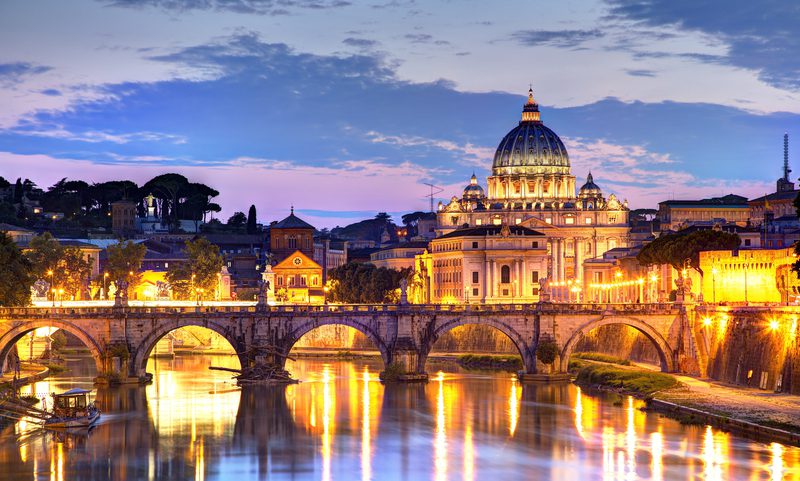If you decide to study abroad in Rome, you will have unprecedented access to some of the most famous landmarks in the world. Obviously, a visit to the Vatican is a must. Gazing up at Michelangelo’s Sistine Chapel and taking in the architectural wonder of Vatican City is an unforgettable experience.
You will inevitably make your way towards the Colosseum. One of the greatest examples of Roman architecture and engineering, it was once the site of gladiator battles. The Colosseum stands the test of time as a historical marvel and a destination on many bucket lists.
Many Rome study abroad programmes will be based within walking distance of other incredible sites, such as the Pantheon, Scalina Spagna, and the Trevi Fountain. Don’t forget to throw a coin into the latter, legend says this ensures a return trip to Rome someday!
Exploration
One of the benefits of studying abroad and living there means you will begin to be drawn to places off the beaten track. For example, the Aventine Keyhole is an opportunity to gaze simultaneously at the amazing landscapes of three different countries through a rather inconspicuous brass keyhole. Located on an unmarked door in a piazza on Aventine Hill, the keyhole offers a perfectly framed view of St. Peter’s Basilica, located in Vatican City. The villa grounds just outside of the door belong to Malta. Beyond the villa, the grounds belong to Italy. You can get an unforgettable view of three countries without even leaving Rome!
Shorter trips to Rome often only explore the sites above ground. Studying abroad in Rome allows you time to tour Underground Rome. Beneath the city lies subterranean sites rich with history. Explore the cells beneath the Colosseum where lions and people awaited their fate before their entrance onto the Colosseum floor. You’ll also have time to visit Saint Peter’s tomb in the Vatican Necropolis, the Domus Aurea, and the Roman catacombs.
Food
The food in Rome is famously delicious and will live up to its distinguished reputation. Your study abroad programme may include a meal plan that would allow you to sample every delicacy in the city.
You will have the opportunity to try authentic Roman street food such as suppli (rice balls that have been fried and stuffed with mozzarella and bolognese sauce). If you are in a rush, you will be able to grab a slice of pizza al taglio, which is crispy, thin, and square. Classic Roman pasta dishes are, of course, available, such as bucatini all’Amatriciana or carbonara.
Every corner in Rome will be able to supply your hungry lips with the best espresso and gelato in the world. You could even spend your time in Rome taking cookery classes and learning how to make the best food in the world for yourself.
Beauty
Your courses during Rome study abroad programmes will be located in some of Rome’s historic centres. Roman landmarks such as the Trevi Fountain, Spanish Steps, Colosseum, Pantheon, and the Vatican may be within a short walking distance.
The campuses you take your courses at will often be outfitted with state-of-the-art computer labs with printing facilities, reference libraries, and student lounges. Be sure to ask your programme coordinator for details about what your campus has to offer you.
You can also be sure that your programme will provide on-the-ground staff dedicated to welcoming and supporting students during their time abroad. These staff members are available to offer study abroad in Rome tips on academics, accommodations, travel advice, and adjusting to a new culture.
Language
Studying abroad in Rome is a great way to immerse yourself in Italian culture and it’s language. Some consider Italian to be the most romantic of the Romance Languages, with the added bonus of being considered one of the easier languages for native English speakers to learn. Many English words actually share Latin roots with Italian words, and verb tenses in English and Italian are very similar. The written Italian word is very phonetic, and therefore easily understood, making it straightforward for beginners to pronounce words from dictionaries.
There’s no better way to learn a language than through immersion. For those interested in learning as much Italian as possible, many programmes offer certificate programmes or full coursework in Italian language – be sure to ask your programme coordinator or advisor for details. Incorporating foreign language proficiency into your undergraduate curriculum and enhancing your CV will open many doors to you in the future. You can also fully immerse yourself in the Italian language by choosing an Italian homestay during study abroad in Rome. You’ll be able to experience authentic Italian life and surround yourself with native Italian speakers.
Travel
When studying abroad in Rome, you are situated in central Italy and the heart of Europe. The opportunity to see the world is quite literally at your doorstep! Many Rome study abroad programmes offer travel opportunities as a part of your study abroad package.
Look out to see if day trips to Assisi, Spello, and the Umbria region are included in your programme. You will be able to explore medieval villages, enjoy sightseeing with an art professor, tour the Basilica of St. Francis, visit a mill, and indulge in delicious olive tasting.
SEE ALSO: Study Abroad in Madrid


